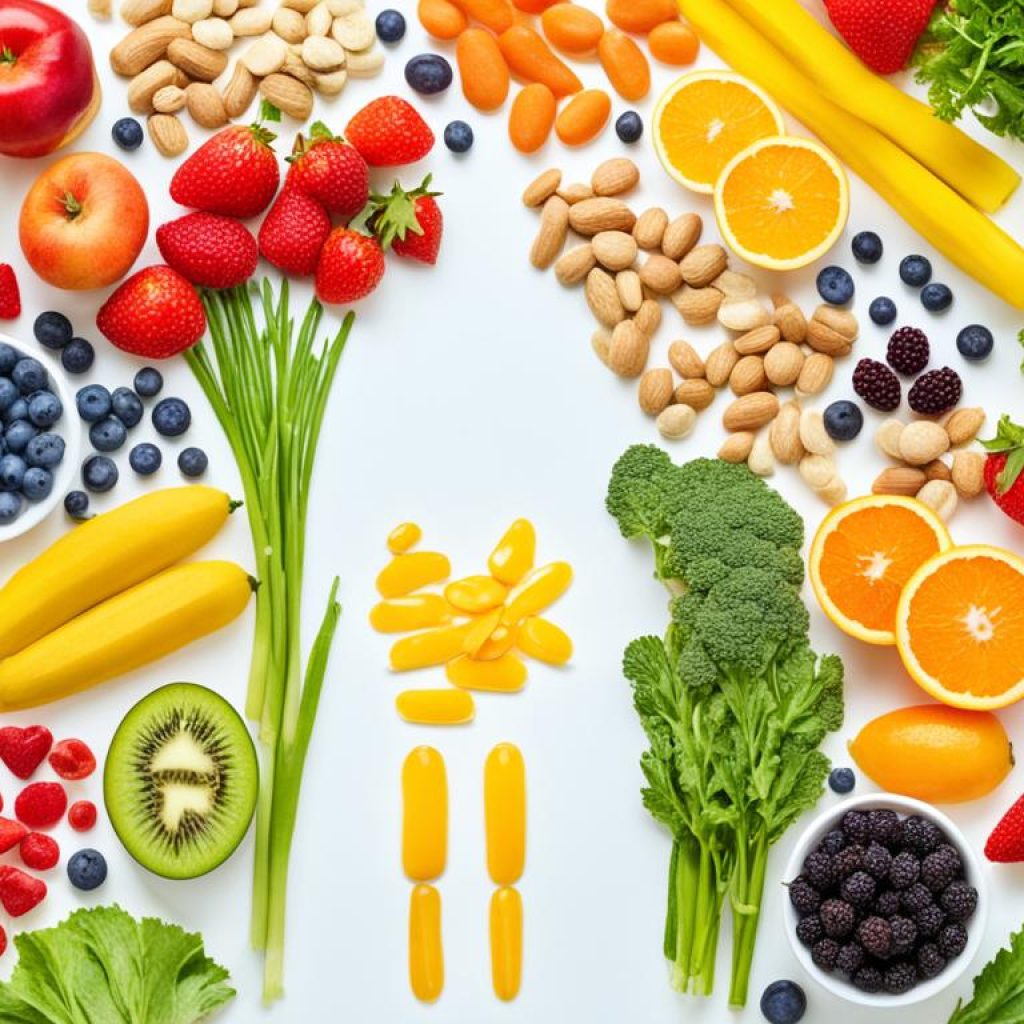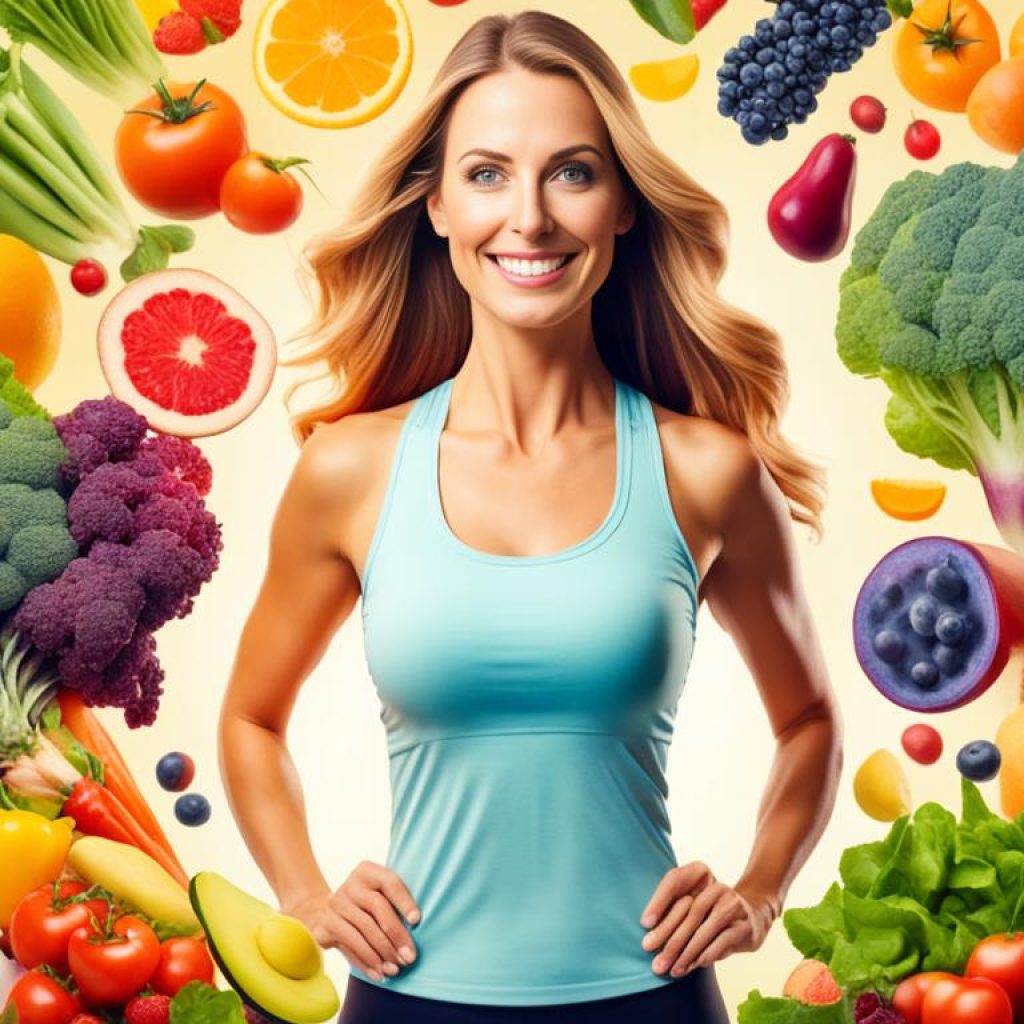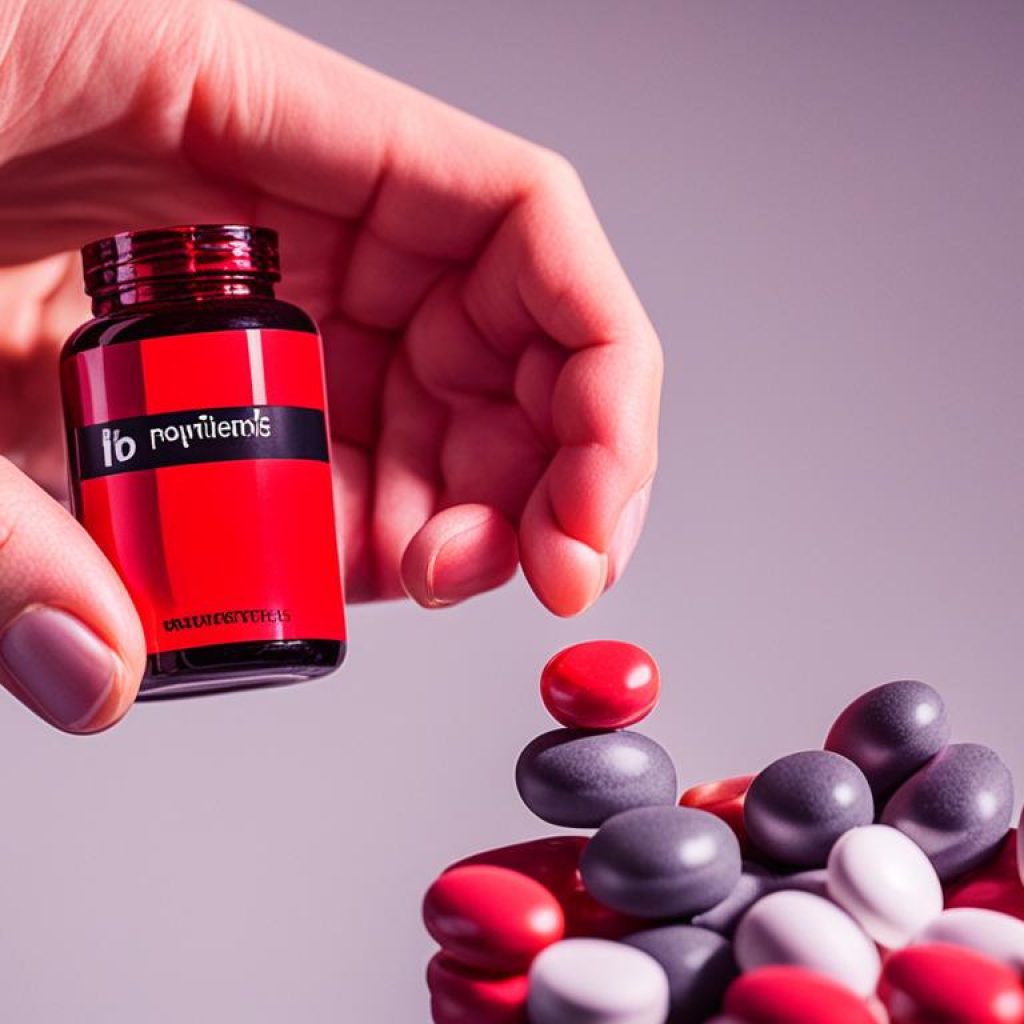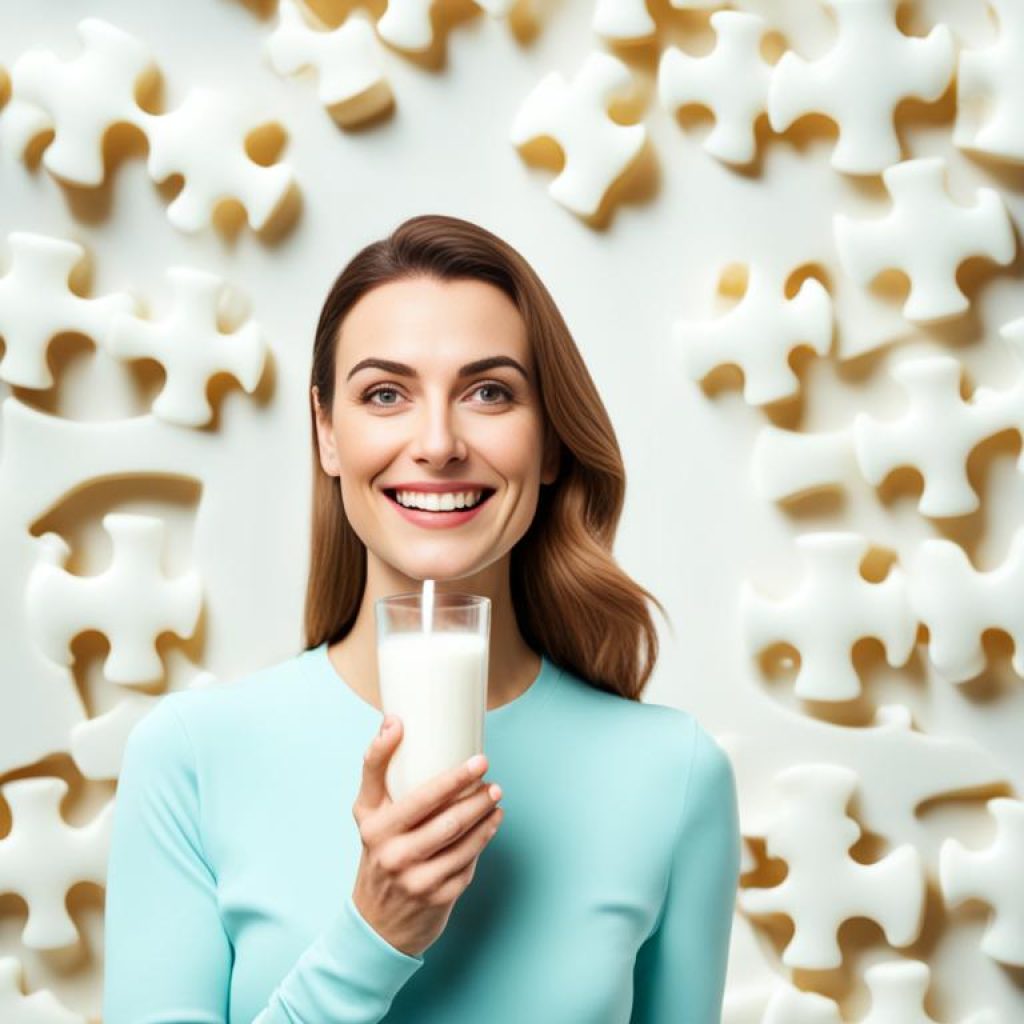Women’s bodies go through many changes from the first period to motherhood and beyond. These changes mean our health needs change too. That’s why it’s key to focus on our nutrition.
Imagine looking in the mirror and feeling full of life. Each glance in the mirror shows you’re strong and resilient. This feeling starts with what we eat.
Choosing the right women’s supplements can change your life. They’re not just remedies but key parts of staying healthy. They help with energy, mood, and staying strong.
The role of best supplements for women is huge. They help with hormone changes, bone health, and energy. Women’s multivitamins are key for our health. They help us live healthier and enjoy every moment.
Key Takeaways
- Women need different supplements because of their unique health needs.
- Important nutrients like iron and calcium are crucial for women.
- Taking supplements regularly can boost wellness and energy.
- It’s important to talk to health experts before starting new supplements.
- Supplements should match the different stages of life.
- Choosing high-quality supplements with clear ingredients is key.
Introduction to Women’s Health & Wellness
Women’s health and wellness face unique challenges at different life stages. It’s key to understand these challenges to improve health outcomes. Regular check-ups and preventive care are crucial for tackling issues like reproductive health and chronic conditions.
The American Congress of Obstetricians and Gynecologists suggests women get their first Pap test at 21. They should keep up with regular screenings to check cervical health.
Health solutions tailored for women are essential for overall well-being. Dietary supplements help meet nutritional needs specific to women, boosting health and wellness. Women over 30 should get co-testing with cytology and HPV every five years. Those 21 to 29 should have a Pap test every three years.
Regular check-ups help catch health issues early. This ensures timely treatment and better health outcomes.
Health and wellness need a full approach, combining prevention and active management. Products backed by 40 years of research offer scientifically validated solutions. With 98% customer satisfaction, making informed choices is easier for women.
For personalized advice, call 1-800-226-2370 from 7:30 AM to 12 AM (ET) weekdays, and 9 AM to 12 AM (ET) on weekends.
The Importance of Nutrition for Women
Nutrition is key to women’s health, affecting hormones and energy levels. Women’s dietary needs change with life stages, making specific diets important. Getting the right vitamins and minerals helps prevent common health issues.
Nutrient Needs Throughout Different Life Stages
Women’s bodies change a lot due to hormones. In their teens, iron and calcium are vital for growing bones and starting periods. When pregnant, folate and omega-3 fatty acids are crucial for the baby’s health and preventing early births.
As women get older, calcium and vitamin D are important for strong bones during menopause.
Common Nutritional Deficiencies in Women
Many women don’t get enough vitamins and minerals. Not having enough vitamin D and calcium can lead to weak bones and osteoporosis. Iron deficiency, causing anemia, is a big problem during pregnancy and when menstruating.
Taking women’s vitamins can help fix these nutritional gaps. This improves health and overall well-being.

Key Vitamins and Minerals for Women
Learning about key vitamins for women helps keep us healthy. These vitamins are key for many body functions. They are split into fat-soluble and water-soluble vitamins. Each type has its own benefits for our health.
Fat Soluble Vitamins and Their Importance
Fat-soluble vitamins are A, D, E, and K. They mix with fats and are stored in our bodies. This makes them very important for women’s health. For example, vitamin A helps with vision and fighting off illness. Vitamin D is key for absorbing calcium, which keeps bones strong.
Women between 19 and 50 should get these vitamins every day:
| Vitamin | Recommended Daily Intake | Sources |
|---|---|---|
| Vitamin A | 700 mcg | Carrots, spinach, apricots |
| Vitamin D | 15 mcg | Salmon, eggs, fortified milk |
| Vitamin E | 15 mg | Wheat germ, hazelnuts, sunflower seeds |
| Vitamin K | 90 mcg | Broccoli, spinach, soybean oil |
Water Soluble Vitamins and Essential Benefits
Water-soluble vitamins include the B-complex and vitamin C. We need to get these vitamins often because our bodies don’t store them. They help with metabolism and keep our immune system strong. Here are the daily amounts we should aim for:
| Vitamin | Recommended Daily Intake | Sources |
|---|---|---|
| Vitamin C | 75 mg | Oranges, kiwi, bell peppers |
| Vitamin B6 | 1.3 mg | Fish, potatoes, chickpeas |
| Folate | 400 mcg | Leafy greens, legumes, fortified grains |
| Vitamin B12 | 2.4 mcg | Fish, meat, dairy products |
Many women might need vitamins for women supplements if they eat less or have certain health conditions. For more info on vitamins and minerals, see this guide.

Womens Supplements: A Tailored Approach
Women go through unique changes in their lives, making them need special supplements. Today, more women are looking for supplements made just for them. They face different health issues and need different vitamins and minerals than men.
Why Women Need Different Supplements Than Men
Women’s bodies have different needs because of their reproductive health, menstruation, pregnancy, and menopause. They often lack certain nutrients like iron and B vitamins, which are key for health and energy. Supplements for women focus on these nutrients to fill the gaps in their diets.
This growing interest in women’s supplements shows more women are aware of their health needs.
Formulated Supplements that Address Women’s Unique Needs
Popular supplements for women include iron, omega-3 fatty acids, and vitamins for hormonal balance and bone health. For example, Legion Athletics Triumph Women’s Sport Multivitamin has 250% of vitamin D, important for strong bones. Nutricost’s multivitamin for women also offers a wide range of essential nutrients at a good price.
For women going through menopause, there are special supplements to help with symptoms and health. Ritual Essential for Women 50+ is a top choice, with 330 mg of omega-3s and great reviews. There are many tailored supplements out there, helping women meet their health needs.
For more info on vitamins and minerals for women’s health, check out this article on women’s dietary supplements.
Iron: The Essential Mineral for Women
Iron is key for carrying oxygen and making energy in the body. Many women don’t get enough iron, which can be a big problem, especially for those who menstruate or are pregnant. It’s important to know the signs of iron deficiency and how much iron you need every day to stay healthy.
Understanding Iron Deficiency and Its Risks
Feeling dizzy, tired, or short of breath can be signs of iron deficiency anemia. Teen girls, women with heavy periods, and pregnant women are more likely to get this condition. Getting regular blood tests can help spot iron deficiency and check your health. If you need more iron, taking supplements is an option, but too much can be harmful. Always talk to a doctor before starting supplements.
Sources and Recommended Daily Intake for Women
Women who aren’t yet menopausal need 18 mg of iron a day. Pregnant women may need up to 27 mg. Good sources of iron include:
- Red meat
- Turkey
- Lentils and beans
- Dark leafy greens
- Iron-fortified cereals
- Dried fruits
- Nuts and dark chocolate
Products like Base ControlTM also have iron and other important nutrients. This multivitamin gives you a lot of what you need every day. It also has 14 mg of iron that your body can easily use.
For more info on iron and its importance for women’s health, check out this resource.

| Group | Daily Iron Intake (mg) |
|---|---|
| Pre-Menopausal Women | 18 |
| Pregnant Women | 27 |
| Men | 8 |
| Teen Girls | 15 |
Calcium and Vitamin D: Building Strong Bones
Keeping bones strong is key for women, especially as they get older. Getting enough calcium and vitamin D helps keep bones dense and prevents osteoporosis. These nutrients work together to keep bones healthy all through a woman’s life.
The Role of Calcium in Women’s Health
Calcium is key for strong bones and teeth. Women need different amounts of calcium based on their age:
- Women aged 19 to 50: 1,000 mg
- Women over 50: 1,200 mg
Good sources of calcium include:
- Milk and dairy products like cheese and yogurt
- Leafy green vegetables like kale and broccoli
- Tofu set with calcium and fish like salmon and sardines
Vitamin D’s Contribution to Bone Integrity
Vitamin D helps the body absorb calcium, which is vital for bone health. Adults need 600 international units (15 micrograms) of vitamin D. Our bodies make vitamin D when we get sunlight, but we also need to eat foods with it. Good sources of vitamin D are:
- Fatty fish such as trout and mackerel
- Fortified foods, including milk, yogurts, and breakfast cereals
Not having enough vitamin D can lead to serious health issues, like osteomalacia or osteoporosis. Many in the U.S. don’t get enough vitamin D, so it’s important to focus on getting this nutrient.

B Vitamins: Supporting Energy and Mood
B vitamins are key for energy and mood. They help make red blood cells and keep the nervous system working right. Women can really benefit from these vitamins for their energy and mood.
Essential B Vitamins and Their Benefits
The B vitamins include eight important ones, each with its own health benefits. Here are some of their key advantages:
- B1 (Thiamine): Important for energy and the nervous system. Found in pork, beans, and some cereals.
- B2 (Riboflavin): Helps make energy and keeps skin and eyes healthy. You can find it in milk, meat, and leafy greens.
- B3 (Niacin): Helps fix DNA, send signals, and lower cholesterol. It’s in chicken, fish, and whole grains.
- B5 (Pantothenic Acid): Helps make blood cells and keeps the gut healthy. You can get it from avocados, grains, and eggs.
- B6 (Pyridoxine): Important for brain growth and metabolism. It’s in fish, chicken, and potatoes.
- B7 (Biotin): Good for hair, skin, and nails. You can find it in meat, eggs, and nuts.
- B9 (Folate): Needed for cell growth and DNA. It’s mostly in leafy greens.
- B12 (Cobalamin): Important for cell metabolism and nerves. You can get it from meat, dairy, and fish.
How to Incorporate B Vitamins into Your Diet
To get B vitamins, eat a variety of foods:
| B Vitamin | Recommended Daily Intake (Women) | Common Sources |
|---|---|---|
| B1 (Thiamine) | 1.1 mg | Pork, beans, fortified cereals |
| B2 (Riboflavin) | 1.1 mg | Milk, eggs, leafy greens |
| B3 (Niacin) | 14 mg | Chicken, fish, whole grains |
| B5 (Pantothenic Acid) | 5 mg | Avocados, grains, eggs |
| B6 (Pyridoxine) | 1.3 mg | Fish, chicken, potatoes |
| B7 (Biotin) | 30 mcg | Meat, eggs, nuts |
| B9 (Folate) | 400 mcg | Leafy greens, beans |
| B12 (Cobalamin) | 2.4 mcg | Meat, dairy, fish |

If you have dietary limits or health issues, B vitamin supplements can help. Adding these vitamins to your daily routine can boost your energy and mood. This is key for feeling good overall.
Fish Oil and Omega-3 Fatty Acids
Omega-3 fatty acids are key for women’s health, especially for the heart. They help with brain function and reduce inflammation. Taking fish oil supplements daily can be very beneficial, especially during pregnancy and after.
Heart Health Benefits of Omega-3s for Women
Omega-3s, like DHA and EPA, are great for the heart. They keep blood fats healthy, lower blood pressure, and cut down heart disease risk. Pregnant women get extra benefits as they support the baby’s growth and health.
More omega-3s during pregnancy link to a healthier baby and a longer pregnancy. This is good news for both mom and baby.
Sources of Omega-3 and Recommended Dosage
Fatty fish like salmon, mackerel, and sardines are good sources of omega-3s. But, if eating these fish is hard, fish oil supplements are an easy choice. There are many products out there to fit different needs and tastes:
| Product | Omega-3 per Serving | Price Range |
|---|---|---|
| Maximum Omega 2000 | 2,000 mg | $28.00 – $55.00 |
| Carlson Cod Liver Oil | 1,600 mg | $34.98 – $52.50 |
| Elite Omega-3 Gems | 1,600 mg | $28.20 – $94.00 |
| The Very Finest Fish Oil | 1,600 mg | $28.00 – $55.00 |
| Elite DHA Gems | 1,000 mg | $31.20 – $116.00 |
Experts usually recommend about 250 to 500 mg of EPA and DHA a day for good health. But, everyone’s needs can be different. It’s important to find the right amount for your heart health.
Herbal Supplements for Women’s Wellness
Herbal supplements for women are becoming more popular because they help with many health issues. These natural remedies are key to supporting women’s health at different life stages. It’s important to know about the common herbal supplements and what they are used for.
Common Herbal Supplements and Their Uses
Many herbal supplements are known for their benefits. Here are some examples:
- Black Cohosh: Used since the 1800s to ease PMS and menopause symptoms.
- Fenugreek: Helps nursing mothers produce more breast milk.
- Maca Root: Supports fertility and keeps reproductive hormones balanced.
- Red Clover: Rich in phytoestrogens, helps with menopause estrogen levels.
- Vitex Berry: Helps balance hormones and ease PMS symptoms.
- Raspberry Leaf: Recommended for childbirth and recovery.
- Ashwagandha: Supports stress, hormone balance, and reproductive health.
- Dong Quai: Used in Traditional Chinese medicine for healthy menstrual cycles.
- Ginseng: Helps with libido and fertility.
- Shatavari: Supports female reproductive health and hormonal balance in Ayurvedic practices.
Safety and Efficacy of Herbal Products
It’s crucial to consider the safety of herbal products when choosing supplements. Always talk to a healthcare provider before starting any new supplement. Getting high-quality herbal supplements is key to their safety and effectiveness. Here are some things to keep in mind:
- Know the possible side effects of each supplement.
- Be aware of any interactions with other medicines.
- Make sure the supplement fits your health needs.
Probiotics: Enhancing Digestive Health
Gut health is key for women’s wellness, affecting digestion and more. Probiotics for women boost gut health by adding good bacteria. This helps with digestion and supports the immune system. A balanced gut microbiome can ease health issues and improve daily life.
The Importance of Gut Health in Women
Women face health challenges linked to gut health. Hormonal changes, stress, and diet can upset gut bacteria balance. Probiotics help fix this balance, aiding in managing health problems like UTIs and digestive issues. Strains like Lactobacillus rhamnosus and Lactobacillus reuteri are good for urinary and vaginal health.
Choosing the Right Probiotic Supplement
Choosing the right probiotic supplement is important. Here are some tips:
- Strain Variety: Choose products with strains like Lactobacillus rhamnosus GR-1® and Lactobacillus reuteri RC-14® for better health benefits.
- Colony-Forming Units (CFUs): Look for 1 billion to 10 billion CFUs for effective digestive health support.
- Refrigeration Needs: Some probiotics need to be kept cold to stay potent. Check the label for storage advice.
- Pricing: Prices range from $12 to $50 per bottle. Higher prices often mean more research and quality checks.
Women should take probiotics daily for better digestion and urinary health. They are safe for pregnant and breastfeeding women, helping both mom and baby.
| Probiotic Strain | Health Benefits | Recommended Dosage (CFUs) |
|---|---|---|
| Lactobacillus rhamnosus GR-1® | Supports urinary tract health | 1-10 billion |
| Lactobacillus reuteri RC-14® | Promotes vaginal health | 1-10 billion |
| Bifidobacterium longum | Aids digestive disorders | 1-10 billion |
| Lactobacillus fermentum | Potential mood enhancement | 1-10 billion |
Adding probiotics to your daily routine strengthens digestive health and offers gut benefits. Always get advice from a professional to find the best probiotic for you.
Magnesium: Supporting Relaxation and Sleep
Adding magnesium to your daily routine is key for better relaxation and sleep. It helps with muscle relaxation, stress, and sleep quality. Since many people lack enough magnesium, knowing its benefits is crucial for good health.
The Role of Magnesium in Women’s Health
Women need at least 310 milligrams of magnesium every day. This need goes up during pregnancy and breastfeeding. Magnesium supplements can help with sleep issues, like insomnia or anxiety. Some types, like magnesium citrate and glycinate, have special benefits.
Magnesium citrate helps older adults sleep better. Magnesium glycinate can also reduce depression symptoms.
How to Ensure Adequate Magnesium Intake
Eating foods high in magnesium is a great start. Foods like dairy, fish, fruits, legumes, nuts, seeds, and whole grains are good choices. If you’re thinking about magnesium supplements, talk to a healthcare provider first, especially if you have health issues.
Too much magnesium can cause stomach cramps and other digestive problems. This shows why it’s important to take the right amount.
Many people look for natural ways to fight insomnia. Magnesium is a good option compared to melatonin. Exploring these supplements can help create a better sleep plan. For more info on magnesium and sleep, check out Sleep Foundation.
| Form of Magnesium | Benefits | Recommended Use |
|---|---|---|
| Magnesium Citrate | May reduce insomnia | Older adults |
| Magnesium Glycinate | Helps with depression symptoms | Individuals with anxiety |
| Magnesium L-threonate | Improves cognitive function | Those experiencing anxiety |
| Magnesium Oxide | Might alleviate insomnia | Older adults |
The Benefits of Antioxidants in Women’s Supplements
Antioxidants are key to fighting off oxidative stress, which can lead to aging and disease. They help boost the immune system and keep the eyes and skin healthy. That’s why antioxidant supplements are important for women’s health.
What Are Antioxidants and Why Are They Important?
Antioxidants fight off free radicals in the body. Studies show they can cut the risk of age-related eye disease by up to 25% in people over 50. Vitamins C and E from natural sources of antioxidants may also lower cataract risk, helping with clearer vision.
Eating foods rich in antioxidants can keep the heart healthy and skin looking good. This is a great way to support women’s health overall.
Sources of Antioxidants in Foods and Supplements
Women can eat foods full of antioxidants to get these benefits. Here are some top sources:
- Fruits and Vegetables: Berries, citrus fruits, and leafy greens
- Whole Grains: Oats and brown rice
- Nuts: Walnuts, pecans, and chestnuts
- Dark Chocolate: Contains higher concentration of cocoa solids
- Red Wine: Contains resveratrol, linked to potential cancer treatment impacts
- Coffee: A primary source of antioxidants in the typical U.S. diet
Some people get their antioxidants from food, while others take antioxidant supplements. These supplements can offer a lot of nutrients. But, it’s important to be careful since the FDA doesn’t regulate them. Always talk to a doctor before starting any supplement, especially if you’re pregnant or nursing.
Conclusion
Knowing what women need nutrition-wise is key to better health and wellness. This article looked into important supplements for women at different life stages. With most US adults taking supplements, it shows how crucial products like multivitamins are for staying healthy.
Supplements are vital for fixing common gaps in nutrients like iron, vitamin D, and omega-3 fatty acids. Using these supplements helps women meet their health goals. Talking to health experts helps women make smart choices, especially about mixing supplements with other medicines.
In the end, taking care of women’s health means more than just supplements. It’s also about eating well to meet our nutritional needs. Choosing the right supplements is a smart move for a healthier life and better well-being.
FAQ
What are the best supplements for women’s health?
The top supplements for women include tailored multivitamins, iron, calcium, vitamin D, B-complex vitamins, omega-3 fatty acids, herbal supplements, and probiotics. These help address unique health needs and fight common nutritional gaps in women.
How do I know which vitamins for women I need?
To figure out which vitamins you need, think about your age, lifestyle, diet, and reproductive health. Talking to a healthcare provider can help spot specific deficiencies and suggest the right supplements for you.
Are herbal supplements for women safe to use?
Herbal supplements for women are safe if they come from trusted brands and are taken as directed. Always talk to a healthcare provider before starting any new herbal supplements to avoid side effects and interactions with medicines.
What role does iron play in women’s health?
Iron is key for carrying oxygen in the body and making energy. Women, especially those who menstruate or are pregnant, are more likely to lack iron. This can cause tiredness and anemia. Eating iron-rich foods and taking supplements can help keep iron levels up.
How can I support my bone health as a woman?
For strong bones, focus on getting enough calcium and vitamin D. Eat dairy, leafy greens, and fortified foods, and get vitamin D from the sun. Supplements can also be important for bone density.
What are the benefits of taking omega-3 fatty acids?
Omega-3s, like EPA and DHA, are great for the heart and brain in women. They reduce inflammation and may lower the risk of chronic diseases. Good sources are fatty fish and high-quality fish oil supplements.
How do B vitamins support women’s health?
B vitamins are vital for energy, mood, and brain function. Vitamins like B6 and B12 are key for mental health and energy. If you’re not getting enough from food, consider supplements.
Why are probiotics important for women’s wellness?
Probiotics are key for gut health, which affects overall wellness. They keep the microbiome balanced, support the immune system, and may improve digestion. Choose high-quality probiotic supplements or eat fermented foods.
Can antioxidants in women’s supplements help with aging?
Yes, antioxidants fight oxidative stress, which helps slow aging. Vitamins C and E, along with other antioxidants, support skin health and boost the immune system. They’re important for women as they age.
What is the importance of magnesium for women’s health?
Magnesium is crucial for managing stress, helping muscles work right, and improving sleep. It’s important to get enough magnesium through food or supplements for overall wellness.
Leave a Reply